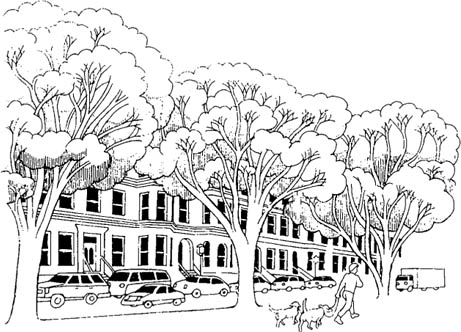

CHAPTER 62
… a fine understanding … that seeks after truth, and loves that which is plain and upright, is worthy of all honour and praise.
Martin Luther
Mary Kelly was restless. She had finished grading her half of the final papers. She was free to return to the problem of Kay Kraeger’s vicious attack on her ex-husband. Mary had followed the Pansy track as far as Kiddy Kamp, but now—it was the Tuesday before Easter—she was stuck. She dropped into the Church of the Commonwealth to report her stalled progress to Martin Kraeger.
It was spring on Commonwealth Avenue. The trees along the narrow park were like tall flowers, their branches airy and transparent, their gold-green tassels hanging like strands of gossamer. The tassels were pollen cases, and the pollen lay beneath the trees like a bright shadow. Beyond the trees on either side of the avenue the houses were distinguished presences, their windows dark, their occupants invisible. Mary imagined majestic personages sitting in great chairs, gazing at the light.
Kraeger wasn’t in church. Loretta Fawcett didn’t know where on this earth he was. “If you ask me, he’s neglecting his duty. He’s never in his office. He doesn’t answer the phone. And there’s, like, people in trouble probably, trying to reach him, people on their deathbed.”
Loretta was partly right. Martin was in a crisis of passive despair. The things that usually occupied his time seemed empty and futile. His unpopularity was clear. There were conspicuous absences in the pews on Sunday mornings. After the service, people shook his hand feebly, failing to meet his eyes.
His only escape from the sense of approaching doom was to sit in the sanctuary when Barbara Inch was putting the Good Friday soloists through their paces. Only then was there worth in the world, only then did chaos part to reveal a marvel flowering in the wilderness.
For her part Barbara was acutely aware that Martin Kraeger was sitting below her, listening to everything that went on in the balcony—the plea of one of the tenor soloists to cut out all the da capo parts from the arias, and her reply, “Why not? The purists will hate us, but everybody else will be grateful.” He heard the kidding between the two bass soloists, he heard the soprano muff an entrance over and over.
Hour after hour Kraeger sat with folded arms, while through all the reworking of tricky places and the breakings off and startings again, the burden of the music of the Passion according to St. John threaded its way. What is truth? sang Pilate. What indeed, wondered Martin Kraeger.

But this morning there was no rehearsal. In Loretta Fawcett’s little office Mary could hear only an occasional hooting note from the organ. Martin was elsewhere.
She wandered into the corridor, and at once found another restless soul, Barbara Inch. “Oh, good morning,” said Mary. “We’ve met before. I’m Mary Kelly. Homer and I came to see you, to ask about Rosalind Hall. Remember?”
“Of course I remember.”
“We’re coming to hear the St. John on Saturday night. You don’t happen to know where I can find Mr. Kraeger, do you?”
“No, I’m afraid not. Sometimes when we’re rehearsing he comes to listen. But there are no rehearsals today. There’s just one more on Thursday night, and we’re not ready. There’s so much to get done.” Panic-stricken, Barbara hugged her arms to her breast. She glanced anxiously at Martin’s office door. “I hope he’s all right.”
Her voice was strained. Mary sensed an ally. “How about a cup of coffee? Have you got time to walk over to Boylston Street?”
Barbara seemed pleased. “There’s a coffeemaker in the music room.”
They sat down amid the cellos and basses, the tangle of music stands, the leaning rows of folding chairs. Barbara poured two cups of coffee and brought them to the table, shoving aside a choir robe.
Mary got down to business at once, probing carefully. “What do you think about the rumor that’s going around, about Mr. Kraeger and his little daughter?”
Barbara showed her colors at once. “It’s ridiculous. Anyone who knows him can see how silly it is. His wife sounds like a dangerous woman.”
Mary smiled. “Good. I was hoping you’d say that. I agree completely. Homer and I are trying to help.” Grasping her coffee cup, she leaned forward and told Barbara what she had learned about Kiddy Kamp from Millie Weideman, whose daycare center had been closed after Kay Kraeger’s malicious insinuations.
Barbara gazed intently into her coffee cup. “You know there’s always gossip around a church. Jeanie Perkupp told me Mrs. Kraeger’s made trouble before. Her son worked in the same office with her once. He told Jeanie that Kay was always accusing people of one thing or another, trying to get them fired. She finally got herself fired.”
Mary sipped her coffee. “That’s very interesting. Perhaps there’s a pattern, some kind of repeated—what do you call it?—neurotic conduct.”
Barbara jumped at the idea. “Let me help. I’ll see what I can find out about her. I’ll have plenty of time after Easter Sunday.”
“Good. We’ll track down her entire history. I suspect she’s a professional predator who gets her kicks by smashing crystal vases.”
“That’s right,” said Barbara, thinking of the crystal vase that was Martin Kraeger.